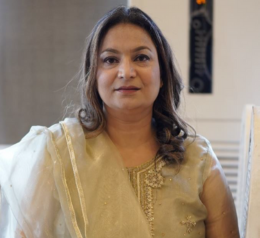INTERNATIONAL WOMEN'S FORUM
THEME: "Breaking Barriers, Shaping the Future of Women"
 17-18 Mar 2025
17-18 Mar 2025  Amsterdam, Netherlands
Amsterdam, Netherlands THEME: "Breaking Barriers, Shaping the Future of Women"
 17-18 Mar 2025
17-18 Mar 2025  Amsterdam, Netherlands
Amsterdam, Netherlands 
Pakistan
Title: Ending Gender-Based Violence
Anila Dilawaiz is a devoted social
worker and ordained Women Pastor from Grace Assemblies of Pakistan, with 17
years of service to her community. She leads "Voice of the Lord
Ministries," working on projects ranging from women empowerment to child
protection and cancer care. Holding a Master’s in Church Theology (MTh), Anila
is also the South Asian Prayer Coordinator for Operation Christmas Child (OCC)
and part of its National Leadership Team.
In addition to her community work,
she has formed a legal team providing pro bono support in human rights cases.
Anila actively conducts small group training sessions addressing forced conversions
and child marriages. For over 15 years, she has empowered women in rural areas
by teaching skills like sewing and stitching to promote financial independence.
Anila also works to raise awareness about child sexual abuse and paedophilia,
and she spearheads the "Good Samaritan" project, raising funds to
support cancer patients. Furthermore, she has established two schools that
offer free education and housing to underprivileged children and orphans,
contributing to their brighter future.
The World Economic Forum’s Gender Gap
Index 2024 ranks Pakistan 145th out of 146
Countries. This number has worsened
compared to previous years, which means that the state of women's rights in
Pakistan is currently declining. One of the main factors contributing to this ranking
is gender-based violence in Pakistan, along with diminutive political
involvement, the education gap, and the deteriorating state of women's economic
empowerment.
The most prevailing issue in Pakistan
against the growth of women's rights is gender-based
violence. Women in Pakistan are
facing grave challenges beyond mere discrimination. Honour killings, acid
attacks, forced marriages and conversions, female genital mutilation and child marriages
are just the tip of the iceberg. Violence takes birth when a right is violated,
and for a country which is considered the world’s second-worst in gender
equality, the path to progress is long and perplexing.
GBV is a gross infringement of Human
rights that not only harms the physical body, but
triggers psychological issues, and
creates emotional distress, whether it is experienced at familial, communal or
national level.
This paper calls for an end to
gender-based violence vis-à-vis Human Rights through
political reforms, legislative
structural changes, and institutional legal reforms. A call for Action is
required to end cultural stereotypes, enhance the economic participation of
women, close the gaps in the provision of education and health and raise more
awareness and empowerment by working at a grass-root level.